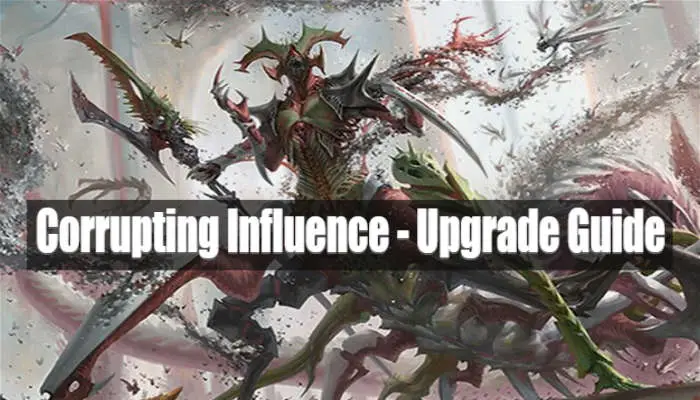Commander is the most popular MTG format and the reconstructed decks for the format and wildly popular. That said, players are always hyped for the reveal of the newest decks. Phyrexia: All Will Be One is set to release on February 10th and is bringing two brand-new decks with it. They are:
The first, called Rebellion Rising is a Boros (Red/White) token-based deck. The second is called Corrupting Influence is an Abzan (White, Black, and Green) built around Poison Counters.
The Corrupting Influence deck is the focus of today’s article. I’ll be going over the out-of-the-box strategy, both commanders, the best/worst cards, and the stock deck lists. Additionally, I’ll give you three different ways to upgrade the stock list and a high, medium, and low budget for each upgrade path. There’s a lot to cover here, so let’s jump right in.
Related: Rebellion Rising: Commander Precon Upgrades
General Overview
Before we get to the upgrades, let’s look at the general strategy for Corrupting Influence, right from the box. It’s built around giving opponents Poison Counters. However, the precon gives us a much more mid-range style strategy than we’re used to for Infect. That said, depending on which of the two included commanders you play, the win condition/strategy changes just a bit.
For example, the face commander generates value for you each turn once one or more opponent has three or more poison counters. So, while the goal is still to Poison players, you could generate enough value to close out some games without getting an opponent all the way to 10 poison. While the same probably can’t be said of the alternate commander.
We’ll go over each commander and how they play in detail below. However, poisoning opponents, generating value for each player with three or more counters, and proliferating are at the heart of what the deck wants to do.
The Commanders
Corrupting Influence has two different legendary creatures in the deck’s Abzan (White, Black, Green) colors that can be the commander. I’ll preface this by saying that they play quite differently than one another. As a result, I don’t think one is strictly better than the other – Which one you play will depend on your play style and preferences.
Let’s kick things off with the face commander, Ixhel.
Ixhel, Scion of Atraxa
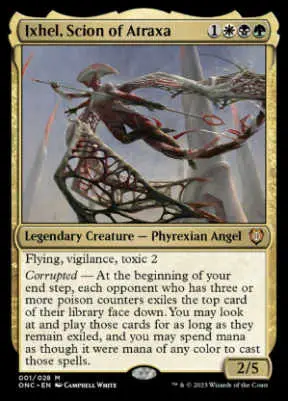
Starting off with the body of the card, you get a four-mana 2/5 with flying, vigilance, and toxic 2. The built-in evasion here is good, as it’ll help connect with opponents even if the
Next, vigilance means that you can attack and still have a five-toughness creature to block with. This will help you be able to attack more often, even if some opponents can threaten you with attacks of their own. Overall, I think the face commander does a pretty good job of setting you up with some safe, consistent attacks.
Moving on to the end of turn trigger – I am always a fan of commanders where you don’t have to wait for a rotation of the table to generate some value. Having said that, once an opponent is adequately poisoned, this ability can generate quite a lot of value. Your goal here would be to get each opponent to the requisite three eventually but I like that you can pile a few counters on the player with the best threats and go ahead and get this rolling.
My main takeaway from Ixhel, Scion of Atraxa is that she allows you to play a non-aggro version of Infect. Usually, Infect in EDH, tries to get the biggest threat at the table to 10, then move on to the second and third afterward. This, however, allows you to get each player to only three, sit back and start riding the value train. This is a very nice change of pace for the archetype and will probably bring some new player interest in playing it.
Recommended commander for:
- Players who like mid-range
- Players who enjoy casting other players spells
- Anyone interested in a new take on Infect
- Players in a more control-based playgroup
| Pros | Cons |
| Has evasion | Not aggressive |
| Generates value beyond poison counters | Requires some setup |
| Let’s you cast opposing spells | |
| Gives the archetype some resiliency against removal |
Vishgraz, the Doomhive
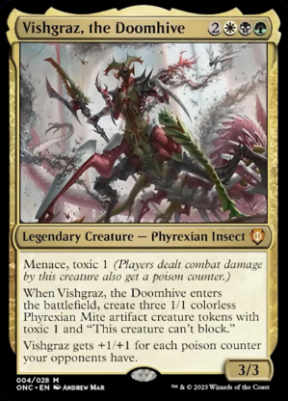
Starting with the stats, you get a 3/3 body with Menace and toxic one for five mana. Comparing it to the face commander, you still have the toxic keyword present as well as some evasion. Again evasion and toxic are great together. However, Vishgraz is more oriented toward attaching than Ixhel is. Speaking of attacking, the fact that it gets a +1/+1 counter for each poison counter all opponents have means it can be massive later in the game.
Moving on to the other ability – anytime Vishgar, the Doomhive enters the battlefield you’ll create three 1/1 creature tokens with toxic 1. So, even if no opponents have been poisoned yet, this will generate a total of six power/toughness spread across four bodies, which is pretty insane. Furthermore, when Vishgar enters with even a few +1/+1 counters the amount of power this could bring to the
Recommended commander for:
- Aggressive players
- Players who like go-wide strategies
- Players who enjoy tokens
- Anyone looking to play a more traditional Infect strategy
- Players in more creature-based or aggressive playgroups
| Pros | Cons |
| Good attacker/has evasion | Weaker against removal/boardwipes |
| Enables an aggressive strategy | |
| Creates tokens | |
| Grows into a larger threat as the game goes on |
Which Commander Is Better?
Overall, I think Vishgraz, the Doomhive is the stronger of the two commanders. However, I think the stock list is geared enough toward the face commander’s strengths to make it a personal preference as to which one you put into the command zone. That said, Vishgar is the more aggressive choice and you’ll certainly be looking to get all three opponents to lethal poison counters to win.
Also, each has its strengths & weaknesses and pros & cons which I listed above – So, check those out if you’re on the fence. At the end of the day though, both cards are in the precon so feel free to switch them around and test them both out.
Deck List
Corrupting Influence
Best New Cards So Far
Here are my top picks for best cards out of the new cards the deck introduces.
Glissa’s Retriever
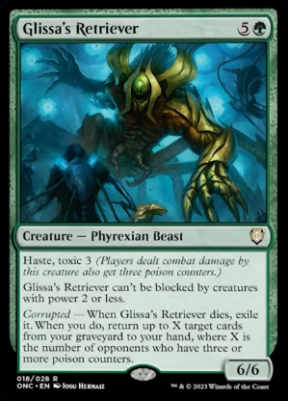
This cost quite a bit to cast but you get a lot for your six mana. First off, Haste and toxic are a great combination for catching an opponent with no blockers off guard. Next, the fact that it can simply be chump blocked adds a lot of upsides here. Lastly, if/when the Retriever dies, it can return some number of cards from your graveyard to your hand. If a few players have the requisite three counters, this can be a lot of value.
Furthermore, I like the fact that he has toxic 3 himself. So, hypothetically speaking, if you attack the right player at the right time, you could get back at least one card with no preexisting counters. Lastly, I expected this effect to limit the cards you could return to creatures – The fact that it didn’t give it some nice versatility in the late game. I think this is a solid draw if you’re ahead, behind, or at parity in the game, and that’s always good.
Wurmquake
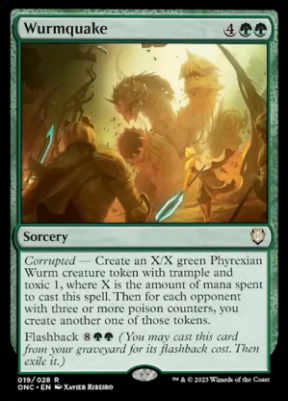
This has an ok floor and an amazing ceiling. The first time you cast this, you’re going to create a 6/6 with Trample and toxic 1 without fail. However, depending on how many players are Corrupted, you could create as many as four of these tokens. 24 power and toughness for six mana is a pretty stellar rate.
Considering the size of the tokens is dependent on the amount of mana you spent, when you flash this back you’ll be creating 10/10 tokens. So, at best you could be getting a total of 40 power on
Glistening Sphere
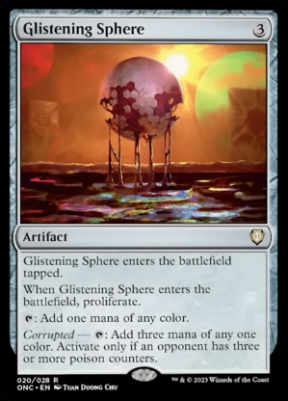
Given how many great two CMC mana rocks there are, there has to be some nice upside on three CMC rocks. This card has an upside. First, whenever it enters the battlefield you’ll get to proliferate. Second, if any opponent has three or more poison counters, it taps for three mana of any one color. Granted it enters tapped but some ETB value diminishes this downside some.
Back-tracking to the proliferation – Assuming you’ve managed to poison any player by the time you cast this you’ll automatically to 2/3’s of the way to having the full potential of the card online. Given that most of the deck is dedicated to getting to that three-counter sweet spot, I don’t think this will take too long. Plus, mana rocks aren’t usually awesome top decks late-game. That said, this one could potentially knock someone out of the game.
Geth’s Summon
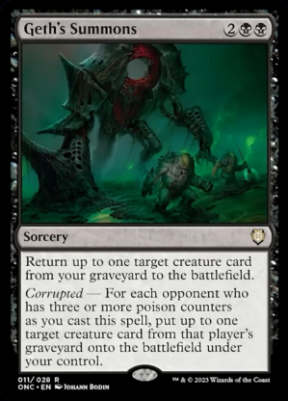
Similar to the card above, Geth’s Summons get’s better the more opponents are corrupted. For four mana, you’ll always get to reanimate something from your own graveyard. However, for each opponent that has three or more poison counters, you’ll get to reanimate something from that player’s graveyard as well. If you get even one creature beyond your own you’ve done well for your four mana.
I think this could be a game-winning card if you manage to get two or three powerful cards off of this. There is also a lesson to be had here – Even if you plan to get counters on all players evenly and then proliferate your way to victory consider getting the strongest player at the table to three counters first.
Phyresis Outbreak
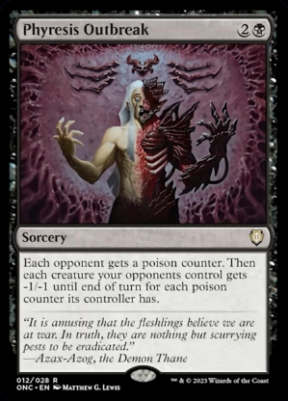
This card is great. The text “Each opponent gets a poison counter.” to kick off Phyresis Outbreak is amazing. It’s straight to the point and is exactly what the deck wants to be doing. Then, it goes on to become a three-mana, one-sided
At the point in the game where you’ll likely be wanting to cast
Related: Best Black Board Wipes
Worst Cards In The Deck So Far
These aren’t bad cards in general but I think they’re odd fits for this precon.
Norn’s Annex
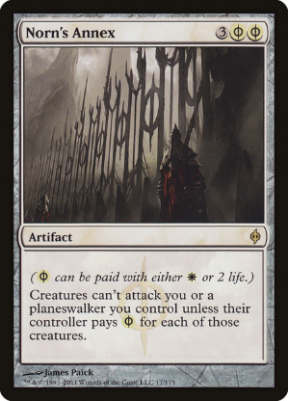
This isn’t an all-around bad card if you’re using Ixhel, Scion of Atraxa as your commander and want some redundancy with your pillow fort effects. However, the casting cost on this isn’t the best unless you fork over two to four life. Honestly, paying life isn’t a huge deal in commander but that’s exactly what makes this card so-so at best – Giving opponents the option to pay life to have their creatures attack gives them a little too much freedom and they’ll always pick the option that’s best for them.
Scavenging Ooze
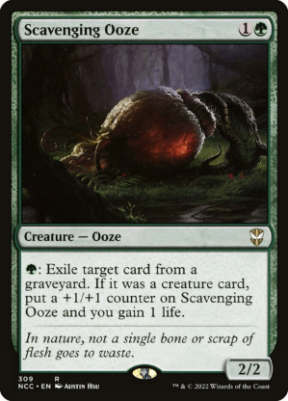
The Ooze is a great card in many formats – EDH included. With that said, I don’t think it’s a great fit in this precon. It doesn’t have Infect or Toxic, it doesn’t proliferate, or protect you. Furthermore, with Geth’s Summons being such a powerful card, I feel like you’ll want to leave some threats in the graveyard instead of gaining a counter and a life with this.
Moldervine Reclamation
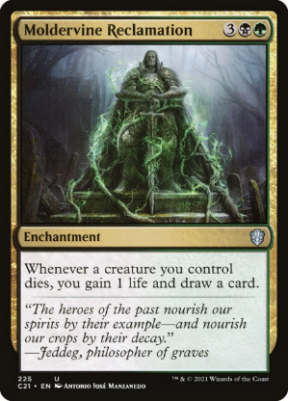
This card certainly has its place in other decks but considering there are no life gain or sacrifice synergies in the deck this card feels a bit random. Even incidental card draw is good but there are better things to be had for five mana.
Chromatic Lantern
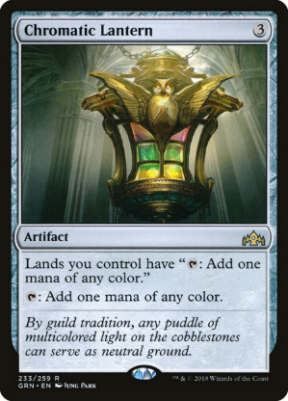
For like the fourth time we have a good card that’s bad in this deck. Given that this is only a three-color deck and one of those colors is Green, I think this card is far from necessary in the deck. In fact, I think you could simply play any signet in place of this and be good to go.
Phyrexian Rebirth
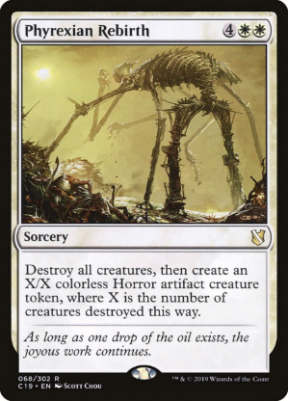
Straight from the box, the deck has five
Upgrading The Deck
Today I have three different upgrade paths that you could take the deck. For each upgrade, I’ll include a budget and full-price version. That way, regardless of your budget, you’ll have options available for each theme I’m going to go over. So, without further ado, let’s get into the Corrupting Influence upgrades.
Method One: Gradual Infect – Low-Budget
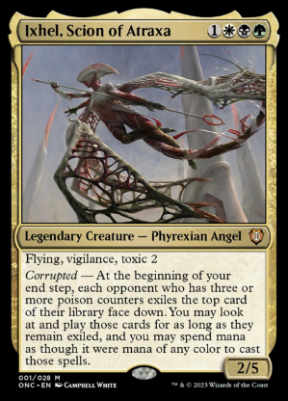
For this version, we’ll be leaning heavily into getting all opponents corrupted (having at least three poison counters) and then generating value while playing a longer, less aggressive game. For this build think “the first few poison counters are the most important” not the last few. For this build, we’ll keep the face commander.
The total price for the upgrades here is around $25. The upgrades here will be focused around helping the deck maintain and stabilize in the late game and making sure there are plenty of ways to proliferate counters onto players.
Asceticism – $9
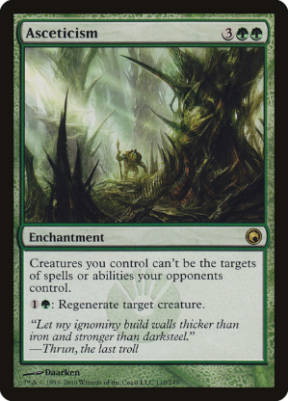
The bane of Infect is not being able to keep creatures on the
What To Take Out: Moldervine Reclamation
Park Heights Maverick – $0.20
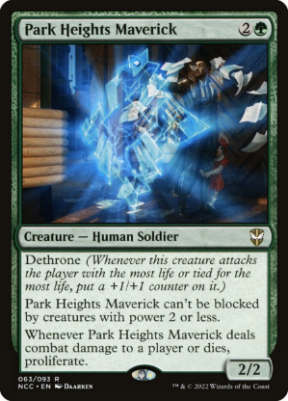
I think the stock list is pretty well geared for getting at least one poison counter on each opponent. That said, Park Heights Maverick is going to pay dividends once the deck has done so. First, no matter what happens after this is resolved, you’re going to get a proliferation off of it.
Considering it can’t be chump blocked, it’s quite easy to get through at least a few times. That said, if left unchecked, it can grow into a sizable threat thanks to Dethrone. Overall, it’s a great attacker and blocker since it proliferates upon death as well. It’s going to be hard for your opponents to interact with this at all and come out on top.
What To Take Out: Scavenging Ooze
Ajani, Sleeper Agent – $2.65
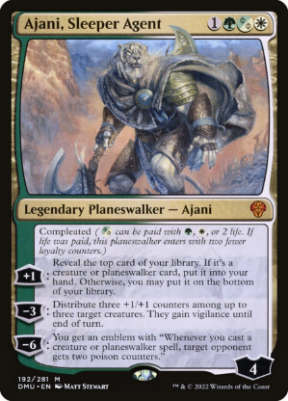
Ajani, Sleeper Agent does quite a bit that I like. The +1 is able to dig for threats and helps to ensure the deck doesn’t run out of steam. The -3 pumps up a few creatures which isn’t bad; However, what I really like here is the Vigilance. It allows you to more freely attack while maintaining your ability to block on subsequent turns.
The ultimate here is quite capable of closing out games very quickly. That said, given the amount of proliferation in the deck – Getting to and activating this -6 can easily be pulled off well ahead of schedule.
What To Take Out: Chromatic Lantern
Contagion Engine – $7
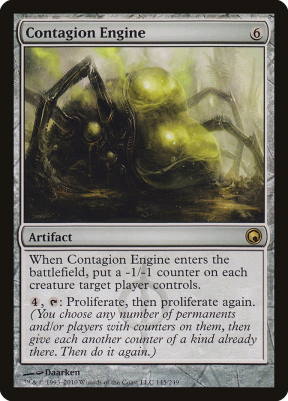
This card requires quite a lot of mana to be put into. However, given the nature of this build, this could be a 10-mana win the game on the spot card. Not to mention it when you activate this you’ll be giving whatever creature got the -1/-1 counter a -3/-3 in total. Make no mistake about it, this is a must-answer card for opponents. If it stays on
What To Take Out: Trailblazer’s Boots
Eternal Witness – $1.35
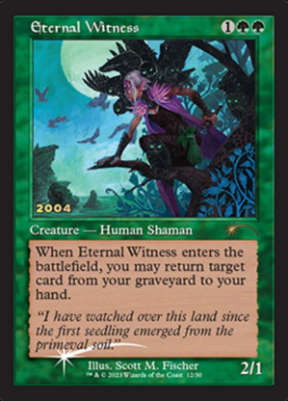
This one is purely value-based. Make no mistake about it, your important pieces are going to get removed or counted. Eternal Witness gives you a second chance at whatever key pieces you may have in your graveyard and that’s invaluable for this build.
What To Take Out: Carrion Call
Planewide Celebration – $0.85
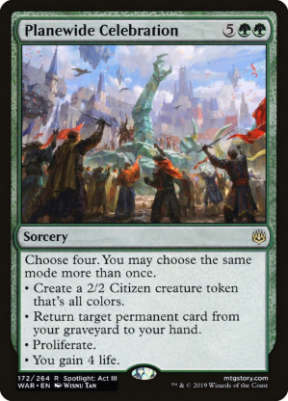
Seven mana is a lot but man, this card pulls its own weight in the deck. It can put a total of eight power and toughness onto the
What To Take Out: Phyrexian Rebirth
Core Prowler – $0.54
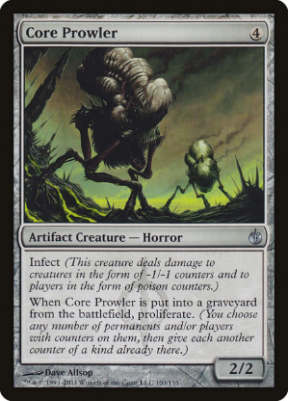
I’m removing a creature without Infect or Proliferate to add this. The thought behind this swap is pretty simple – Increase the redundancy of both aspects of the deck. It also adds some more resiliency to the deck considering you’ll generate some value from this even when it’s destroyed.
What To Take Out: Mycosynth Fiend
Dusk // Dawn – $0.18
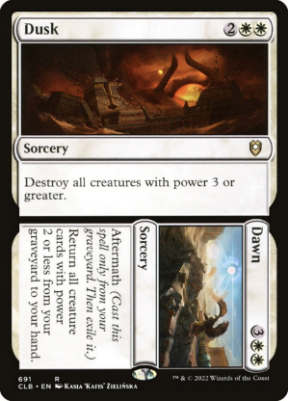
The vast majority of the creatures in the deck have low power. Therefore Dusk // Dawn can be a great one-sided
What To Take Out: Fumigate
Method One: Gradual Infect – Non-Budget
Keeping every upgrade from the budget section above – We’ll be swapping out another seven cards here. This batch of upgrades will run you around $100. So, with everything mentioned above and here, you’ll be spending about $125 in total.
Yawgmoth, Thran Physician $19
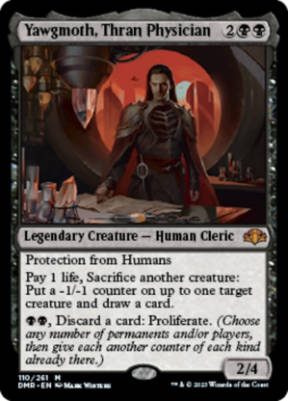
This card offers the deck a ton of value, card advantage, and a possible win condition. Given the amount of recursion that the deck has post-upgrade, discarding cards to proliferate is amazing. The same can be said for sacrificing our creatures since so many of them proliferate when they die. With even a few counters on each opponent, Yawgmoth can close out games quickly.
What To Take Out: Norn’s Annex
Skithiryx, the Blight Dragon – $18
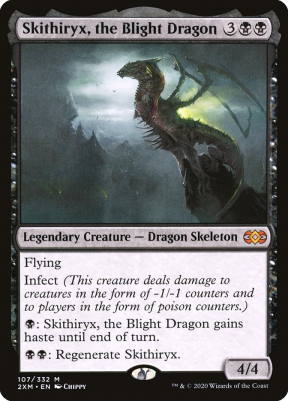
Skithiryx is a beast where Infect is concerned. First, he has a natural four power and Infect, so one connection can put an opponent nearly halfway poisoned to out of the game. Next, he has evasion that makes him a legitimate threat to connect if someone doesn’t have flying blockers. This is especially true since he can gain Haste and take players completely off guard. And last, but certainly not least, he has some built-in protection in the form of regeneration.
This card does everything you want it to and then some. So, there’s no reason other than his price tag to leave him out of the deck here. If you own a copy or have $18 to spare, sleeve him up for sure.
What To Take Out: Grafted Exoskeleton
Phyrexian Crusader – $13
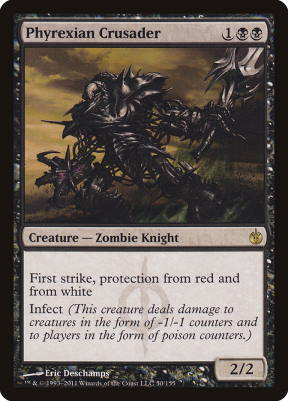
Phyrexian Crusader is one of the more resilient Infect creatures in the game and considering we’re looking to play the long game here, it’s exactly what we want. First off, the First Strike here means that he’s going to shrink many creatures that block it before taking damage himself.
Next, having protection from two entire colors is huge both on offense and defense. So, we’ll 100% be making room for the crusader in our non-budget upgrades.
What To Take Out: Ichorclaw Myr
Hand of the Praetors – $6
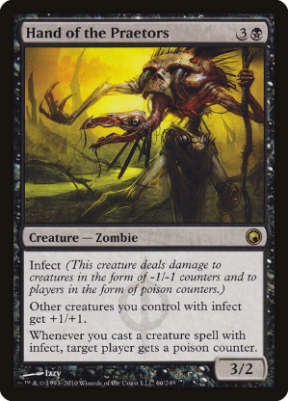
This was a tough cut to make but I wanted this card in the deck. First, it has Infect itself and that will increase the overall redundancy and consistency of the deck. Next, it is a lord for a very high number of creatures within the deck and when you’re only trying to get to ten damage per player, +1/+1 goes a long way. Lastly, and most importantly, for every Infect spells we cast we’ll get to gift an opponent a poison counter.
I had to cut a good card to fit this in but given the amount of proliferation there is post-upgrades, I think Hand of the Praetors is a clear choice here.
What To Take Out: Norn’s Choirmaster
Boseiju, Who Endures – $27
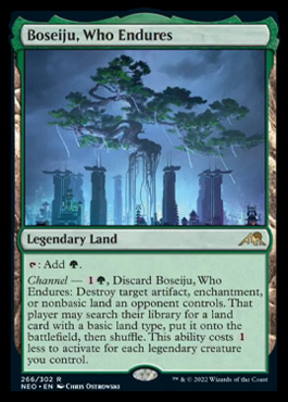
This one is all upside… If you’ve played with or against this card or EDH in general, I don’t have to tell you how good it is.
What To Take Out: Basic Forest
Inkmoth Nexus $30
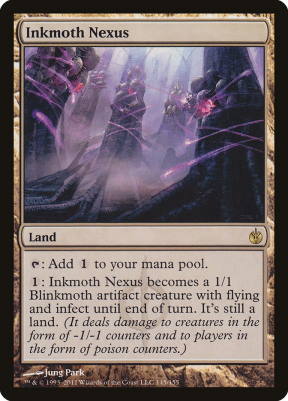
This is a very important tech/man-land in any Infect-based build. If you’re playing the mechanic, don’t leave home without. When every point of damage could be the difference between winning and losing having Inkmoth Nexus hanging out on the field can swing things in your favor.
What To Take Out: Path of Ancestory
Method Two: Go Wide Aggro – Low-Budget

This upgrade path will feature the alternate commander at the helm and will be a much more aggressive strategy that will seek to take advantage of the token and +1/+1 counter synergies here. So, the game plan here is to create tokens, bolster them with +1/+1 counters and give them Infect.
Once again, I’ll show a budget and full-price version. That said, we’ll be changing out more cards for this version. That said, the budget upgrades come to about $40. Let’s jump right in.
Cathars’ Crusade $7
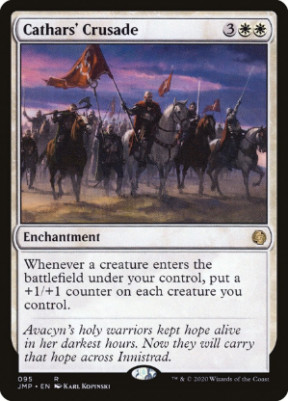
As mentioned, I’ll be looking to pepper the
What To Take Out: Fumigate
Corpsejack Menace – 0.80
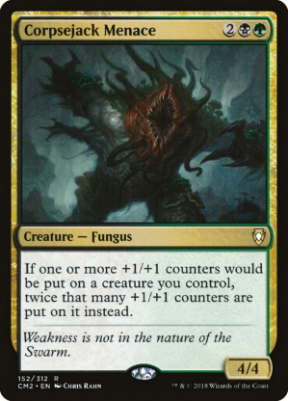
Corpsejack Menace, Cathar’s Crusade, and the ability of Vishgraz, the Doomhive all go hand in hand. With our +1/+1 counter engine online, Vishgraz is going to be very big, very quickly.
What To Take Out: Windborne Muse
Kaya, Geist Hunter – $0.50
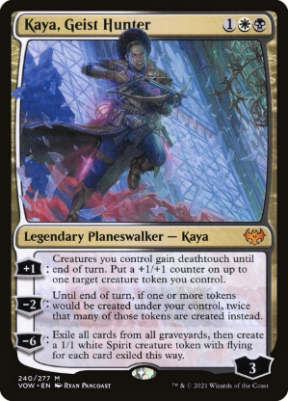
Kaya does more of what we’ve covered so far. Her -2 is amazing to activate the turn when Vishgraz, the Doomhive is cast. In this case, you’d get six of the tokens that he creates instead of three. Her +1 has some nice tech and provides even more counter synergy to the deck.
What To Take Out: Ghostly Prison
Triumph of the Hordes -$14
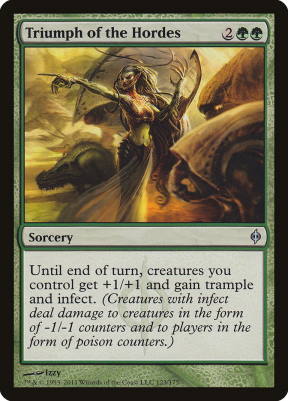
This is one of the main win conditions for the deck. It’s such an all-star that it sees play outside of Infect builds as a way to close out games. Once there is a token army on
What To Take Out: Moldervine Reclamation
Felidar Retreat – $1
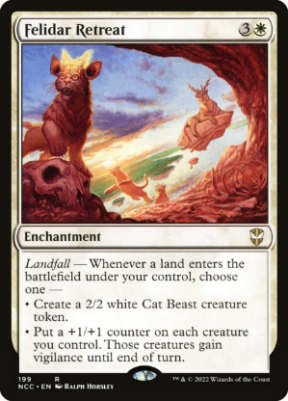
Anytime you want to create tokens or generate counters, this card is a must. It’s good in this build for a few reasons. First, each time the deck makes a land drop it gets to bolster the
Considering there are quite a few ways to give whatever creatures we may have infect, these tokens can come in quite clutch after a
What To Take Out: Chromatic Lantern
Diabolic Tutor – $1
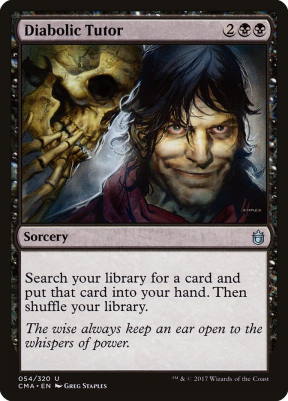
Triumph of the Hordes is going to be the main win condition for the deck. That said, I’m including a few budget tutors to help find what is needed when it’s needed. Not always but most of the time, this will be fetching out Triumph to perhaps a token doubling effect.
Related: Best Black Tutors In MTG
What To Take Out: Norn’s Annex
Tainted Strike – $1
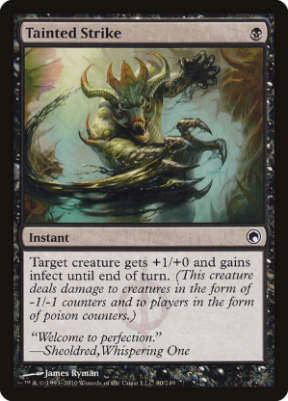
With a
What To Take Out: Trailblazer’s Boots
Resourceful Defense – $4
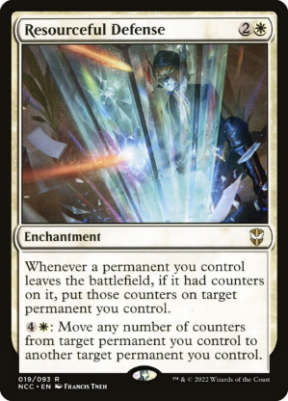
This card is appropriately named – In any deck where you’re using counters, it’s very resourceful. Given all the other resources that are being poured into counters for the Corrupting Influence upgrades, having a way to recycle them is imperative. Think of this card as our budget version of The Ozolith.
What To Take Out: Glissa’s Retriever
Second Harvest $7
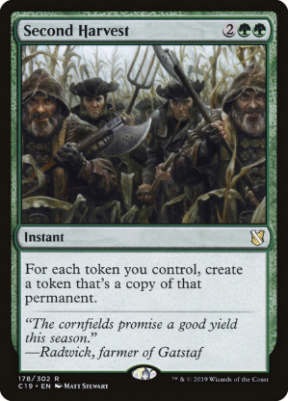
So, I’m sure you’re starting to catch on to the game plan for this version. That said, effects like this are a must. Furthermore, having it at instant speed alongside some of the spells mentioned above can really produce a ton of tokens out of nowhere.
Hardened Scales – $3
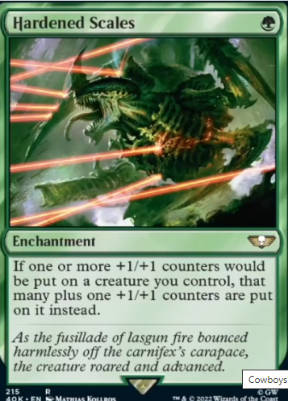
Here’s the cherry on top for this particular upgrade path. Hardened Scales is an absolute must in the deck and will give up an extra counter for each one of the counter-relevant cards mentioned above – Most importantly but not limited to Vishgraz, the Doomhive.
What To Take Out: Scavenging Ooze
Method Two: Go Wide Aggro – No Budget
While this version got most of the things it wanted, even on a budget, there are certainly some things that had to be left out. So, if you’ve got copies of any of the following or have the money to splurge here’s what I recommend. The upgrades in this section total around $200.
The Ozolith – $20
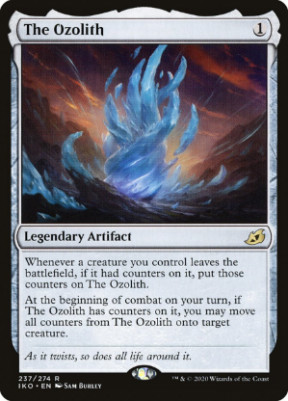
As mentioned above in the section for Resourceful Defense an effect like this is invaluable to creature-based decks using counters. Being able to recycle counters from your commander as he moves from the battlefield to the command zone makes the deck infinitely more potent and resilient to removal spells.
What To Take Out: Glissa’s Retriever if you are upgrading the stock list. If you’ve already made the budget changes then replace [c]Resourceful Defense.
Doubling Season – $80
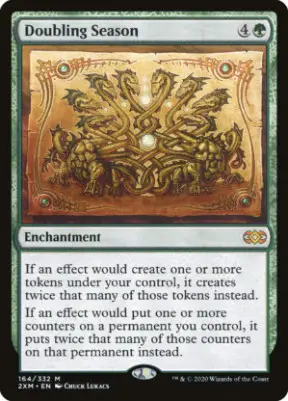
This card is everything the deck wants to be doing for this go-wide version. If you can swing the money to include this in the deck, by all means, play it.
What To Take Out: Phyrexian Rebirth if it’s still in your list and Second Harvest if you’ve added that.
Vampiric Tutor – $32
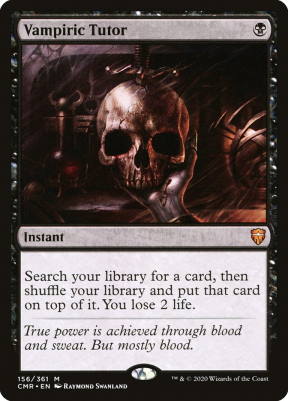
This is simply the best tutor that money can buy – So if you’ve got it, run it. This will be used to grab Doubling Season or Triumph of the Hordes to close out games when you’re ready.
What To Take Out: Norn’s Annex or Diabolic Tutor
I also recommend running Boseiju, Who Endures, and Inkmoth Nexus in the non-budget version here as well. I went over why and what to replace here if you missed it.
End Step
There you have it ladies and gentlemen, your Phyrexia: All Will Be One commander precon deck list, and several ways to upgrade it. I never thought we would see an Infect-themed commander precon but I’m happy that I was wrong. Needless to say, I like this list a lot and I hope you found my upgrade suggestions helpful. Now get one there and play for the glory of Phyrexia.
